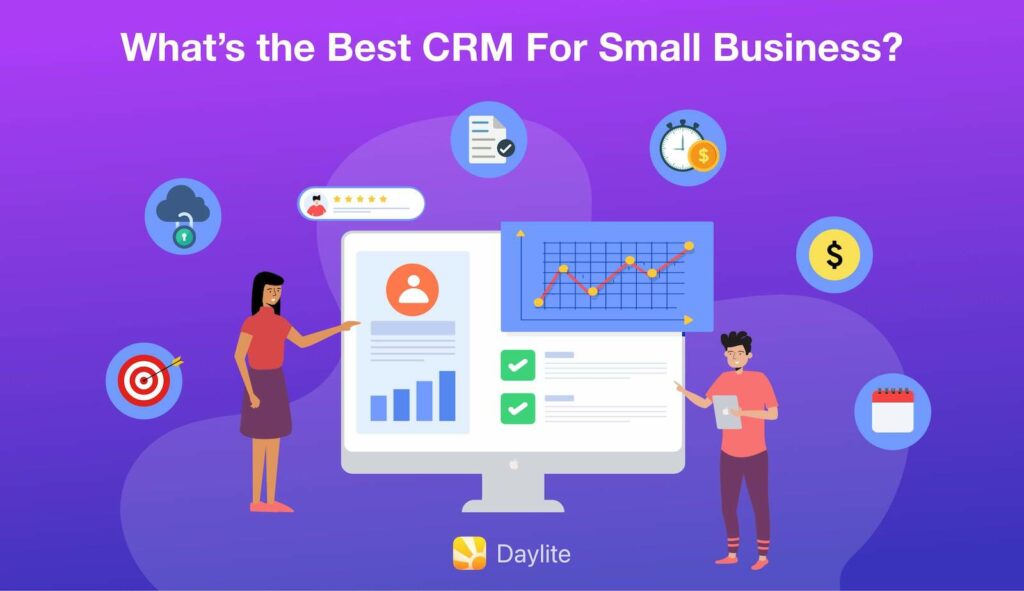Small Business CRM Trends 2025: Navigating the Future of Customer Relationships

Small Business CRM Trends 2025: Navigating the Future of Customer Relationships
The business world is in a constant state of flux. What was cutting-edge yesterday is often obsolete today. This is especially true in the realm of customer relationship management (CRM). As we approach 2025, small businesses must stay ahead of the curve to thrive. This article dives deep into the emerging CRM trends that will shape how small businesses interact with their customers, manage their data, and ultimately, achieve success. We’ll explore the technologies, strategies, and shifts in customer behavior that are redefining the landscape.
The Rise of AI and Automation in CRM
Artificial intelligence (AI) and automation are no longer futuristic concepts; they are integral parts of modern CRM systems. By 2025, we can expect AI to be even more deeply integrated, transforming various aspects of customer interaction and data management for small businesses. Let’s break down some key areas:
1. Personalized Customer Experiences
AI algorithms are becoming increasingly adept at analyzing customer data to understand individual preferences, behaviors, and needs. This allows small businesses to deliver highly personalized experiences across all touchpoints. Imagine:
- Proactive Recommendations: AI suggesting products or services based on a customer’s purchase history and browsing behavior.
- Tailored Content: Websites and emails dynamically adjusting content to match a customer’s interests and stage in the sales funnel.
- Hyper-Personalized Offers: AI generating unique promotions and discounts tailored to each customer’s specific profile.
These personalized experiences not only improve customer satisfaction but also drive conversions and foster loyalty.
2. Automated Workflows and Tasks
Automation streamlines repetitive tasks, freeing up valuable time for small business owners and their teams. By 2025, expect to see even more automation in CRM, including:
- Automated Lead Scoring: AI automatically scoring leads based on their engagement and demographics, prioritizing the most promising prospects.
- Automated Email Marketing: AI crafting and sending personalized email campaigns based on customer behavior and preferences.
- Automated Data Entry: AI automatically entering data from various sources, such as emails, forms, and social media, into the CRM system.
Automating these tasks reduces manual effort, minimizes errors, and allows small businesses to focus on strategic initiatives.
3. Predictive Analytics for Sales and Marketing
AI-powered predictive analytics provide valuable insights into customer behavior and market trends. Small businesses can leverage these insights to:
- Predict Customer Churn: Identifying customers at risk of leaving and proactively engaging them to retain their business.
- Forecast Sales: Predicting future sales based on historical data and market trends, enabling better resource allocation.
- Optimize Marketing Campaigns: Identifying the most effective marketing channels and messages to maximize ROI.
Predictive analytics empowers small businesses to make data-driven decisions, improve their bottom line, and stay ahead of the competition.
The Expanding Role of Mobile CRM
Mobile CRM is no longer a luxury; it’s a necessity for small businesses. As we move towards 2025, the importance of mobile CRM will only continue to grow. Here’s what to anticipate:
1. Enhanced Accessibility and Flexibility
Mobile CRM allows employees to access customer data and manage interactions from anywhere, anytime. This flexibility is crucial for small businesses with remote teams or employees who frequently travel. Expect:
- Real-time Data Access: Accessing the latest customer information, even when offline.
- On-the-Go Updates: Updating customer records and logging interactions directly from a mobile device.
- Seamless Integration: Integrating mobile CRM with other business applications, such as email and calendar.
This enhanced accessibility and flexibility improve productivity, responsiveness, and customer satisfaction.
2. Improved Collaboration and Communication
Mobile CRM facilitates better collaboration and communication among team members. Features like:
- Shared Customer Views: All team members having access to the same customer information.
- Real-Time Notifications: Receiving instant notifications about important customer interactions and updates.
- Integrated Communication Tools: Making calls, sending emails, and accessing chat functionality directly from the CRM app.
These features streamline communication, reduce silos, and ensure everyone is on the same page.
3. Location-Based Services and Geofencing
Mobile CRM can leverage location-based services and geofencing to provide even more valuable insights and functionality. Consider:
- Geofencing Alerts: Automatically notifying sales reps when they are near a customer’s location.
- Location-Based Marketing: Delivering targeted marketing messages to customers based on their location.
- Route Optimization: Optimizing sales routes for maximum efficiency.
These features enhance sales productivity, improve customer engagement, and create new opportunities for small businesses.
The Rise of Data Privacy and Security
As data breaches and privacy concerns become increasingly prevalent, data privacy and security will be paramount in 2025. Small businesses must prioritize these aspects to maintain customer trust and comply with regulations.
1. Enhanced Data Encryption and Security Measures
CRM systems will incorporate stronger encryption and security measures to protect sensitive customer data. This includes:
- End-to-End Encryption: Encrypting data at rest and in transit to prevent unauthorized access.
- Multi-Factor Authentication: Requiring multiple forms of authentication to verify user identities.
- Regular Security Audits: Conducting regular audits to identify and address potential vulnerabilities.
These measures safeguard customer data from cyber threats and ensure compliance with data privacy regulations.
2. Compliance with Data Privacy Regulations
Small businesses must be fully compliant with data privacy regulations, such as GDPR and CCPA. This involves:
- Obtaining Consent: Obtaining explicit consent from customers before collecting and using their data.
- Providing Transparency: Clearly communicating how customer data is being used.
- Offering Data Access and Control: Providing customers with the ability to access, modify, and delete their data.
Compliance with data privacy regulations builds trust with customers and avoids costly penalties.
3. Focus on Data Minimization and Purpose Limitation
Small businesses should only collect and use the data necessary for their specific business purposes. This includes:
- Data Minimization: Collecting only the minimum amount of data required.
- Purpose Limitation: Using data only for the purposes for which it was collected.
- Data Retention Policies: Establishing clear policies for how long data is retained.
These practices help minimize the risk of data breaches and protect customer privacy.
The Importance of Integration and Customization
In 2025, CRM systems will need to seamlessly integrate with other business applications and offer extensive customization options. This will enable small businesses to create a unified and tailored customer experience.
1. Seamless Integration with Other Business Tools
CRM systems must integrate with other essential business tools, such as:
- Marketing Automation Platforms: Integrating CRM with marketing automation tools to streamline lead nurturing and campaign management.
- E-commerce Platforms: Integrating CRM with e-commerce platforms to provide a unified view of customer data and purchase history.
- Help Desk Software: Integrating CRM with help desk software to provide a seamless customer support experience.
These integrations streamline workflows, improve data accuracy, and provide a holistic view of the customer journey.
2. Extensive Customization Options
CRM systems must offer extensive customization options to meet the unique needs of each small business. This includes:
- Custom Fields: Adding custom fields to store specific data relevant to the business.
- Custom Workflows: Creating custom workflows to automate specific business processes.
- Custom Reports and Dashboards: Generating custom reports and dashboards to track key performance indicators (KPIs).
Customization allows small businesses to tailor their CRM system to their specific requirements and maximize its value.
3. Open APIs and Extensibility
CRM systems should offer open APIs and extensibility options to allow for integration with a wide range of third-party applications. This includes:
- Open APIs: Providing open APIs to allow for easy integration with other applications.
- App Marketplaces: Offering app marketplaces with pre-built integrations.
- Extensibility Options: Allowing for the development of custom integrations and extensions.
Open APIs and extensibility options provide small businesses with the flexibility to adapt their CRM system to evolving business needs.
The Evolving Role of Customer Service
Customer service will be more critical than ever in 2025. Small businesses must focus on providing exceptional customer experiences to build loyalty and drive growth.
1. Omnichannel Customer Support
Customers expect to be able to interact with businesses through their preferred channels. Small businesses must provide omnichannel customer support, including:
- Email Support: Providing prompt and efficient email support.
- Phone Support: Offering phone support with minimal wait times.
- Live Chat: Providing instant support through live chat on their website and other platforms.
- Social Media Support: Monitoring social media channels and responding to customer inquiries.
Omnichannel support ensures a seamless customer experience across all channels.
2. Self-Service Options and Knowledge Bases
Customers increasingly prefer self-service options. Small businesses should provide:
- FAQ Pages: Creating comprehensive FAQ pages to answer common customer questions.
- Knowledge Bases: Providing knowledge bases with articles and tutorials to help customers find solutions.
- Chatbots: Implementing chatbots to answer simple questions and provide instant support.
Self-service options empower customers and reduce the burden on customer service teams.
3. Proactive Customer Service
Small businesses should proactively engage with customers to anticipate their needs and resolve issues before they escalate. This includes:
- Proactive Outreach: Reaching out to customers to offer support and assistance.
- Personalized Support: Providing personalized support based on customer data and preferences.
- Feedback Collection: Actively seeking customer feedback to improve products and services.
Proactive customer service builds strong customer relationships and fosters loyalty.
Choosing the Right CRM for Your Small Business in 2025
With so many CRM options available, choosing the right system can be overwhelming. Here are some factors to consider:
1. Assess Your Needs and Goals
Before choosing a CRM, clearly define your business needs and goals. Consider:
- Your Business Size and Industry: The features and functionality you need will vary depending on your business size and industry.
- Your Sales Process: The CRM should align with your sales process and provide tools to manage leads, opportunities, and deals.
- Your Marketing Needs: The CRM should integrate with your marketing tools and provide features for email marketing, social media management, and lead generation.
- Your Customer Service Requirements: The CRM should offer features for managing customer support tickets, providing self-service options, and gathering customer feedback.
Understanding your needs and goals will help you narrow down your options and choose a CRM that is the right fit for your business.
2. Evaluate CRM Features and Functionality
Once you have a clear understanding of your needs, evaluate the features and functionality of different CRM systems. Consider:
- Contact Management: The ability to store and manage customer contacts, including contact information, interactions, and purchase history.
- Sales Automation: Features for automating sales tasks, such as lead scoring, email marketing, and task management.
- Marketing Automation: Features for automating marketing campaigns, such as email marketing, social media management, and lead nurturing.
- Customer Service Tools: Features for managing customer support tickets, providing self-service options, and gathering customer feedback.
- Reporting and Analytics: The ability to generate reports and dashboards to track key performance indicators (KPIs).
- Mobile CRM: The availability of a mobile app for accessing customer data and managing interactions on the go.
- Integrations: The ability to integrate with other business applications, such as email, calendar, and e-commerce platforms.
Choose a CRM that offers the features and functionality you need to meet your business goals.
3. Consider Pricing and Implementation
The cost of a CRM system can vary widely. Consider:
- Pricing Models: Different CRM systems offer different pricing models, such as per-user pricing, tiered pricing, and subscription-based pricing.
- Implementation Costs: The cost of implementing the CRM system, including data migration, training, and customization.
- Ongoing Costs: The ongoing costs of using the CRM system, such as maintenance, support, and upgrades.
Choose a CRM system that fits your budget and offers a good return on investment.
4. Research CRM Vendors
Before making a decision, research different CRM vendors. Consider:
- Vendor Reputation: Research the vendor’s reputation and read reviews from other users.
- Customer Support: Evaluate the vendor’s customer support options and responsiveness.
- Training and Documentation: Assess the vendor’s training and documentation resources.
- Scalability: Ensure the CRM system can scale to meet your future business needs.
Choosing a reputable vendor will ensure that you receive the support and resources you need to succeed.
Conclusion: Embracing the Future of CRM
The CRM landscape is constantly evolving, and small businesses must adapt to stay competitive. By embracing the trends discussed in this article – AI and automation, mobile CRM, data privacy, integration and customization, and enhanced customer service – small businesses can build stronger customer relationships, improve efficiency, and drive growth. As we look ahead to 2025, proactive small businesses that prioritize these strategies will be well-positioned to thrive in the ever-changing business environment.



